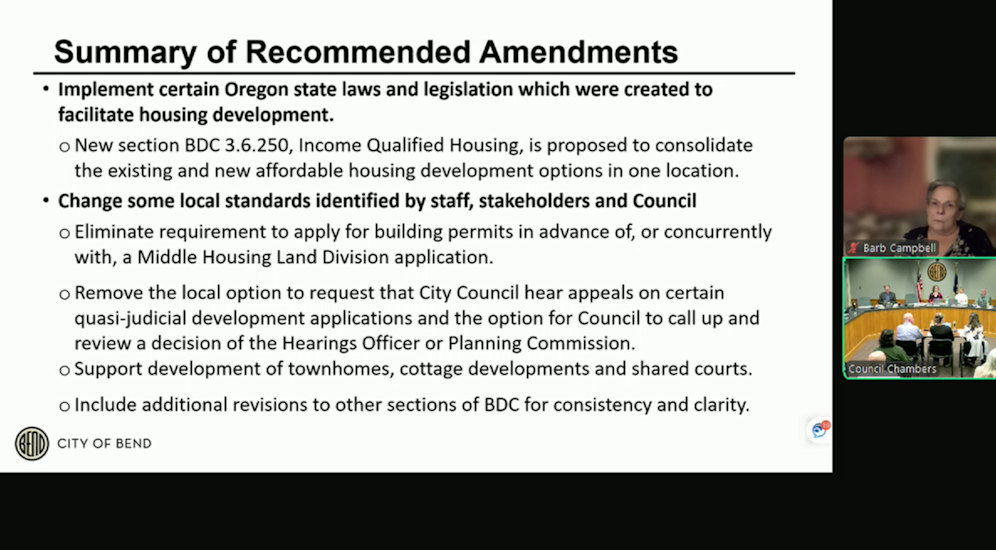Bend city councilors adopt new development rules that mirror new state laws, encourage more new housing

Staff, councilors seek to assure the goal is not to put housing on existing parks
BEND, Ore. (KTVZ) -- After diving deep into complex land-use laws and hearing much impassioned testimony, Bend city councilors voted 5-1 Wednesday night to adopt development code changes to clarify the rules and reflect recent state land-use laws aimed at encouraging more affordable housing.
City councilors and staff sought at every turn to assure the packed City Hall crowd - many worried that allowing housing "outright" on land zoned for public facilities could lead to loss of parks and open spaces - that there still will be approval and appeal processes. They said those rule changes are aimed at possible use of surplus, undeveloped publicly owned property - not developed parks.
"The state is trying to help get more housing on the ground," said city Chief Operations Officer Russ Grayson, and "the city has to react to these bills" and implement them for local developers to follow. In fact, he noted, even before the new development code sections go into effect, "someone could come in and do something under these laws, and the city would have to do it."
Senate Bill 8, for example, says cities must allow "affordable housing" on public land zoned for public facilities, which Bend has nearly 1,300 acres of. But Grayson said that other elected bodies, such as the school and park boards, "will decide what's allowed."
Much consternation was heard about using the term "income-qualified housing" instead of the state's term of "affordable housing," but planning staff and councilors assured that the income requirements (generally 80 to 120% of the area's median income) are the same as the state directed, whatever they're called.
Mayor Melanie Kebler noted that a staff-proposed amendment wouldn't have the Senate Bill 8 rule apply to privately owned land (about 35 acres) zoned for public facilities. However, that amendment failed to gain majority council support.
,Regarding the closely watched potential changes to allow housing on a piece of land by Greenwood Cemetery, Kebler noted that the proposal is going through a separate land use process that will go before a hearings officer and eventually to the city council.
Jim Roberts of the West Hills neighborhood said he uses Hillside Park every day but noted that many people don't have that option, as they must commute from cheaper outlying communities because they can't afford to live in Bend.
"I'm in favor of any tool or lever necessary, even policies like this coming from on high," to address the housing crisis in the community.
A little girl, Violet Davies, testified (along with her parents), and got high-fives from the mayor and council for wanting parks to be protected. "I think we all want to make sure we have parks to play in," the mayor told her.
Later, after public testimony, Kebler said a list going around of parks potentially to be developed was false.
"There is no plan to develop those parks," she said. "I'm very confident in saying that Bend Park and Rec District keeps the parks as public parks. I don't know where that list came from."
Councilor Mike Riley said a rendering opponents distributed of potential housing in parks was aimed to "scare people" and that if any such proposal ever were to come about, "I would do what I could to oppose it."
While the city council will no longer have some options to hear appeals, they still could be appealed at the state level. In the meantime, there could actually be more council discussion with the public about such land use proposals, no longer stymied by the need for legal reasons to avoid any "ex parte contact" before a city hearing happens. Riley said councilors instead "need to focus on good policy."
Councilor Barb Campbell, who voted against the package of changes, said it's as important, if not more so, to contact other entities such as the school and park districts and ask them to "scour" their property tax rolls for surplus land that could hold badly needed housing.
